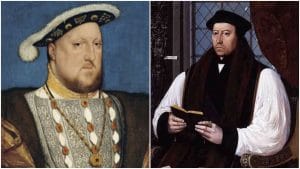 All Souls’ Day is the feast day when forgotten souls, those souls in purgatory who might not have any masses or prayers being said for them, are remembered and it was at the special All Souls’ mass of 1541 that Henry VIII’s happy world came crashing down.
All Souls’ Day is the feast day when forgotten souls, those souls in purgatory who might not have any masses or prayers being said for them, are remembered and it was at the special All Souls’ mass of 1541 that Henry VIII’s happy world came crashing down.
Previous to this, Henry VIII had been blissfully happy. He’d returned from a successful royal progress where he’d received the “humble submission” of the North and he was happily married to his fifth wife, the young Catherine Howard. So happy was he, that it was reported that on the previous day, All Saints’ Day, he had directed the Bishop of Lincoln at mass “to make prayer and give thanks with him for the good life he led and hoped to [lead with her] […]”. This good life was soon over.
When Henry VIII arrived in the Holy Day Closet at Hampton Court Palace for mass on 2 November 1541, he was confronted by Archbishop Thomas Cranmer with a letter that he was to read in private, it concerned a matter that the Archbishop “had not the heart to tell it by word of mouth”. The letter was regarding allegations that had been made concerning the Queen’s past, information that had been given to Cranmer by John Lassells, brother of Mary Hall who, like Catherine Howard, had been a member of the Dowager Duchess of Norfolk’s household at Lambeth and Horsham. A report from the King’s Council to William Paget, the English ambassador in France, gives details about Lassells’ claims:
“Are commanded to signify to him a most miserable case lately revealed. The King, on sentence given of the [invalidity] of his marriage with Anne of Cleves, being solicited by his Council to marry again, took to wife Katharine, daughter to the late lord Edmund Howard, thinking [now in his old] age to have obtained [a jewel] for womanhood, But this joy is turned to [extreme sorrow; for] after receiving his Maker on [All Hallows Day last] and directing the bp. of Lincoln, his [ghostly father], to make prayer and give thanks with him for the good life he led and hoped to [lead with her], on All Souls Day at mass the abp. [of Canterbury] having heard that she was not a woman of [such purity] as was esteemed, sorrowfully revealed it to the King, and how it came to his knowledge.
While the King was in his progress, one John [Lossels] came to the Abp. and told him that he had been with a sister of his, married, in [Sussex], who had been servant with the old duchess of [Norfolk] who brought up the said Katharine, and he had recommended her to sue for service with [the Queen]. She said she would not, but [was very sorry for the Queen]. “Why? quoth Lossels. Marry, quoth she, for she is [light, both in living] and conditions. How so? quoth Lossels.” [She replied] that one Fras. Derham had lain in bed[with her, in his doublet] and hose, between the sheets an hundr[ed nights], and a maid in the house had said she would lie no longer with her because [she knew not what ma]trimony was. Moreover [one] Mannock, a servant of the [Duchess, knew a] privy mark on her body. The Abp., being much perplexed, consulted the lord Chancellor and the [earl of Hertford], and by their advice reported the matter to the King in writing, as he had not the heart to tell it by word of mouth.”
The report goes on to explain that the King thought “the matter forged” and “could not believe it till the certainty was known”, and so ordered a full investigation, instructing his Lord Privy Seal (William Fitzwilliam, Earl of Southampton) to examine Lassells and Mary Hall, and Thomas Wriothesley to examine Henry Manox and “to [take Derrham] on a pretence of piracy”. Everything was to be done discreetly. Unfortunately, the resulting examinations suggested that Lassells’ claims were true:
“Wriothesley found from Mannock’s confession that he used to feel the [secret parts] of her body before Derrham [was familiar] with her; and Derrham confessed that he had k[nown her car]nally many times, both in his doublet and [hose between] the sheets and in naked bed, alleging three women [as witnesses]. On learning this the King’s heart was pierced with pe[nsiveness, so that it was long] before he could [utter his sorrow]; “and finally, with plenty [of tears, (which was strange] in his courage), opened the same.” [Katharine was spoken] to by the abp. of [Canterbury, the lord] Chancellor, the duke of Norfolk, [the lord Great Chamberlain], and the bp. of [Winchester]. She at first constantly denied it, but at last disclosed everything [to the abp.] of Canterbury, who took her confession [in writing] subscribed by her hand. Then [the rest of the witnesses], eight or nine men and women, were examined, and agreed in one [tale].”
Henry VIII was heartbroken.
It was the beginning of the end for Queen Catherine…
Notes and Sources
- Letters and Papers, Foreign and Domestic, Henry VIII, Volume 16, 1540-1541, ed. James Gairdner and R H Brodie (London, 1898), pp. 613-629, 1334. British History Online http://www.british-history.ac.uk/letters-papers-hen8/vol16/pp613-629 [accessed 13 October 2016].